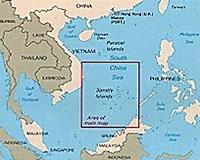 |
Mogadishu, Somalia (UPI) Apr 14, 2011 Somali pirates are increasingly threatening global oil supplies from the Persian Gulf as they extend their attacks ever deeper into the Arabian Sea and Indian Ocean, morphing from a tactical nuisance to a strategic danger. Three supertankers have been seized so far this year, the first time since the piracy plague began in 2006 that so many have been captured in a three-month period. The International Maritime Bureau in London, which monitors international shipping, reports piracy hit an all-time high in the first quarter of 2011 with 142 attacks worldwide, mostly by Somali sea bandits. Of the 97 attacks pinned on Somali pirates -- up from 35 in the equivalent period in 2010 -- 37 were on tankers, including 20 with a deadweight of more than 100,000 tons, the bureau said. "Figures for piracy and armed robbery at sea in the last three months are higher than we've ever recorded in the first quarter of any past year," said Pottengal Mukundan, director of the IMB's piracy-monitoring bureau in Kuala Lumpur, Malaysia. The "dramatic increase in the violence and the techniques" employed by the Somali marauders put large tankers carrying oil or inflammable chemicals at serious risk, he stressed. As the pirates increasingly concentrate their attacks close to the Persian Gulf, calls are mounting for tougher action against the marauders. "The pirates are progressively becoming the masters of the Indian Ocean," Jack Lang, a former French cabinet minister who now advises the United Nations on legal issues concerning Somalia piracy, warned the Security Council in January. The piracy problem "is spinning out of control into the entire Indian Ocean," Joe Angelo, managing director of the International Association of Independent Tanker Owners, declared Feb. 9. "If piracy in the Indian Ocean is left unabated, it will strangle these crucial shipping lanes with the potential to severely disrupt oil flows to the United States and the rest of the world," he said. "We want to see a significant increase in government will to eradicate piracy in this area, and not just contain it." Intertanko members own the majority of the world's tanker fleet. On Feb. 8, the day before Angelo made his call for action, the 105,000-ton Italian tanker Savina Caylyn was seized 800 miles east of Somalia with a cargo of Sudanese oil worth $60 million destined for Malaysia. The following day the Greek-flagged supertanker Irene SL was seized off the coast of Oman with 1.9 million barrels of Kuwaiti crude bound for the United States. The Irene SL's cargo is worth some $200 million at current prices. That's about twice as much as the oil carried by the Saudi supertanker Sirius Star seized in November 2008. These attacks took place near the southern end of the Strait of Hormuz, a narrow waterway that is the only way in and out of the Persian Gulf. Some 40 percent of the world's oil supplies transits the strait every day. Over the last 18 months Somali pirates have become much bolder and more organized, moving eastward to evade the international naval flotillas deployed in the Gulf of Aden to protect the shipping lanes used by some 30,000 merchant ships a year. Now the pirates are able to operate more than 1,000 miles from their bases in Somalia. The pirates' growing capability to undertake long-range operations, even in the stormy monsoon seasons, has taken them to waters not systematically patrolled by naval forces. They now use trawlers and other merchant vessels they capture as "mother ships" for boarding crews who use 20-foot skiffs to attack their prey. Piracy is costing the global economy $7 billion to $12 billion a year, the shipping industry says. A report by One Earth Future, a governance foundation in Colorado, estimated piracy costs the industry up to $3.2 billion annually in extra insurance and another $2.95 billion to reroute vessels around the Cape of Good Hope. The average ransom has risen from $3.4 million per ship in 2009 to $5.4 million in 2010. A record $9.5 million was paid out Nov. 6, 2010, for the Samho Dream, a 300,000-ton South Korean supertanker and its 24-man crew. It was hijacked in the Indian Ocean April 4, 2010, carrying 2 million barrels of Iraqi crude to the United States.
Share This Article With Planet Earth
Related Links Powering The World in the 21st Century at Energy-Daily.com
 Philippines protests China's Spratly claim at UN
Philippines protests China's Spratly claim at UNManila (AFP) April 14, 2011 The Philippines said Thursday it had lodged a formal protest at the United Nations over China's claims to the Spratly islands and adjacent South China Sea waters. The newest controversy in the decades-old multilateral dispute centres on formal notes sent by China to the UN secretary general in 2009 outlining the basis of its claim, foreign ministry spokesman Ed Malaya said. "Yes, we can ... read more |
|
| The content herein, unless otherwise known to be public domain, are Copyright 1995-2010 - SpaceDaily. AFP and UPI Wire Stories are copyright Agence France-Presse and United Press International. ESA Portal Reports are copyright European Space Agency. All NASA sourced material is public domain. Additional copyrights may apply in whole or part to other bona fide parties. Advertising does not imply endorsement,agreement or approval of any opinions, statements or information provided by SpaceDaily on any Web page published or hosted by SpaceDaily. Privacy Statement |